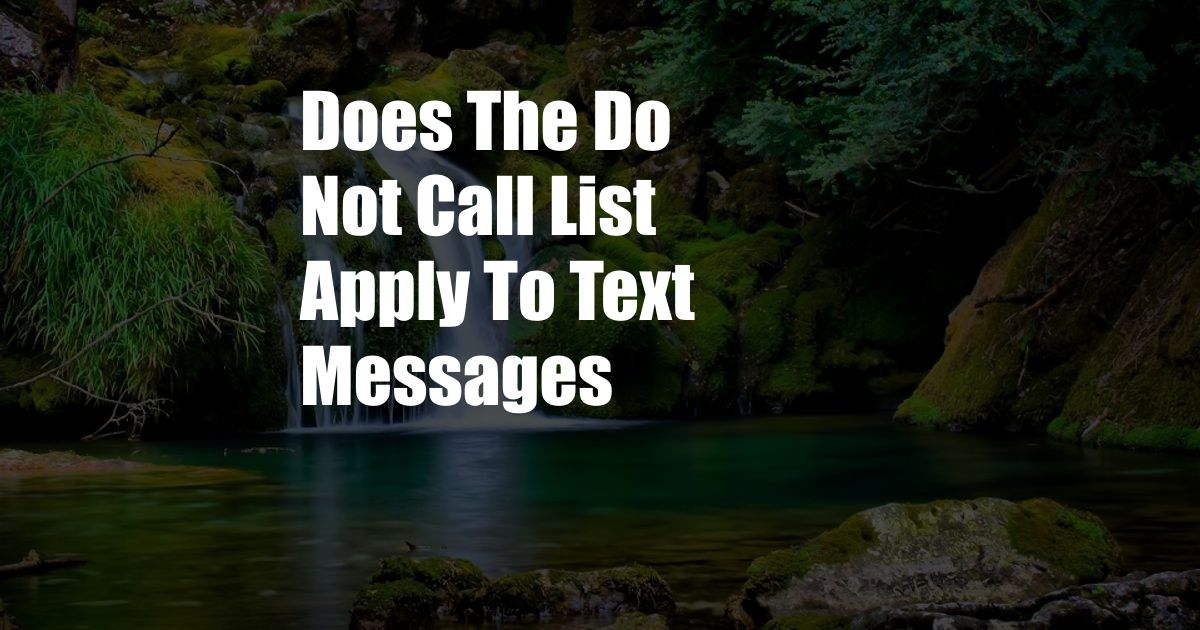
**Does the Do Not Call List Apply to Text Messages?**
In the era of relentless communication, we’ve all received that unwelcome text message from an unknown number, peddling products or services we have zero interest in. It’s a frustrating experience, and many people wonder if there’s a way to shield themselves from this digital bombardment.
The National Do Not Call Registry is designed to protect consumers from unwanted phone calls. But does its jurisdiction extend to text messages? Let’s delve into the intricacies of this topic.
**The Scope of the Do Not Call List**
The National Do Not Call Registry was established in 2003 by the Federal Trade Commission (FTC) to curtail unsolicited marketing calls. It prohibits businesses from calling or texting individuals who have registered their numbers on the list.
However, there are certain exceptions to this rule. Political organizations, charities, and companies you’ve previously done business with are exempt from the National Do Not Call Registry. Additionally, text messages that provide information about an existing transaction or service are not covered by the registry.
**Text Message Spam: A Growing Concern**
In recent years, there’s been a surge in spam text messages, known as “smishing.” These messages often contain malicious links, phishing scams, or attempts to steal personal information. Smishing is a significant problem, and it has prompted many to ask whether the National Do Not Call Registry can help protect them from this digital nuisance.
**The Limitations of the Do Not Call List**
Unfortunately, the National Do Not Call Registry does not apply to text messages. This is because text messages are considered a different form of communication than voice calls. As a result, businesses are free to send text messages to individuals on the National Do Not Call Registry without violating the law.
However, some states have passed their own laws that regulate commercial text messages. For example, California has a law that requires businesses to obtain consent before sending marketing text messages to individuals in the state. If you reside in California, you may have more options to protect yourself from unwanted text messages.
**Tips to Avoid Text Message Spam**
1. Register with Your Carrier’s Spam Blocking Service:
Many cellular carriers offer spam blocking services that can filter out unwanted text messages. Contact your carrier to see if they provide this service and how to activate it.
2. Use a Call and Text Blocking App:
There are several third-party apps available that can block unwanted calls and text messages. These apps allow you to create a blacklist of numbers to block, as well as identify and filter out suspected spam messages.
3. Never Click on Suspicious Links:
If you receive a text message containing a link, be cautious before clicking on it. Hover your mouse over the link (without clicking) to see where it leads. If the destination website looks suspicious, do not click on it. It could be a phishing scam designed to steal your personal information.
4. Report Spam Messages to the FTC:
If you receive a spam text message, you can report it to the FTC. This helps the FTC track down spammers and take enforcement action against them.
**Frequently Asked Questions (FAQs)**
Q: Do I have to pay to register for the National Do Not Call Registry?
A: No, registering for the National Do Not Call Registry is free.
Q: How long does it take for the National Do Not Call Registry to take effect?
A: It takes 31 days for your number to be added to the National Do Not Call Registry.
Q: Can I block text messages from specific numbers?
A: Yes, you can block text messages from specific numbers by using your phone’s built-in blocking feature or a third-party call blocking app.
Q: Is it illegal to send spam text messages?
A: Yes, it is illegal to send spam text messages to individuals who have not consented to receive them.
Q: What should I do if I receive a spam text message?
A: Report the spam text message to the FTC and consider blocking the number.
**Conclusion**
While the National Do Not Call List does not apply to text messages, there are several strategies you can employ to protect yourself from text message spam. By following the tips outlined in this article, you can reduce the number of unwanted text messages you receive and enjoy a more peaceful digital experience.
Are you interested in learning more about how to protect yourself from spam text messages? Share your thoughts and experiences in the comments section below.